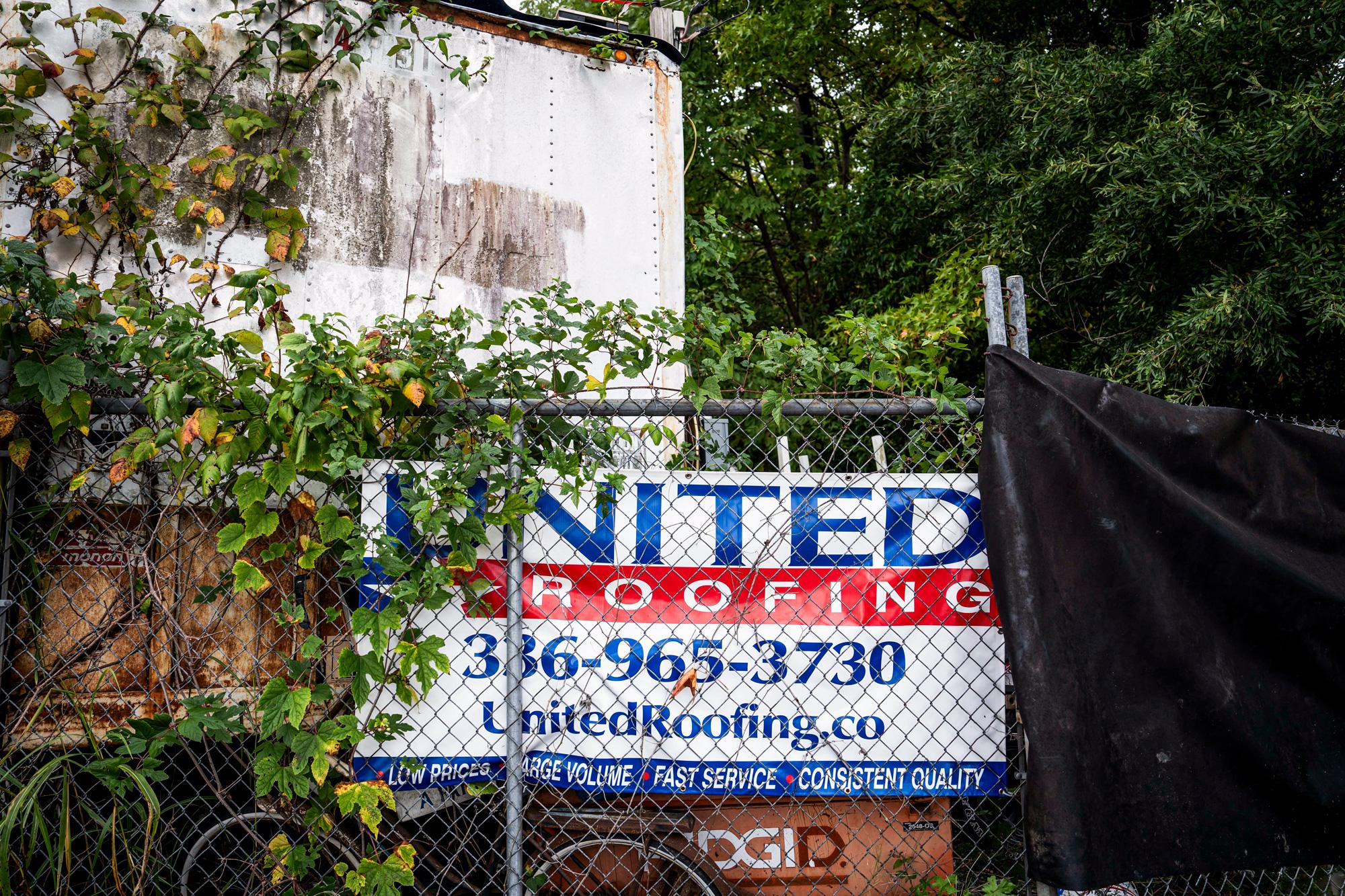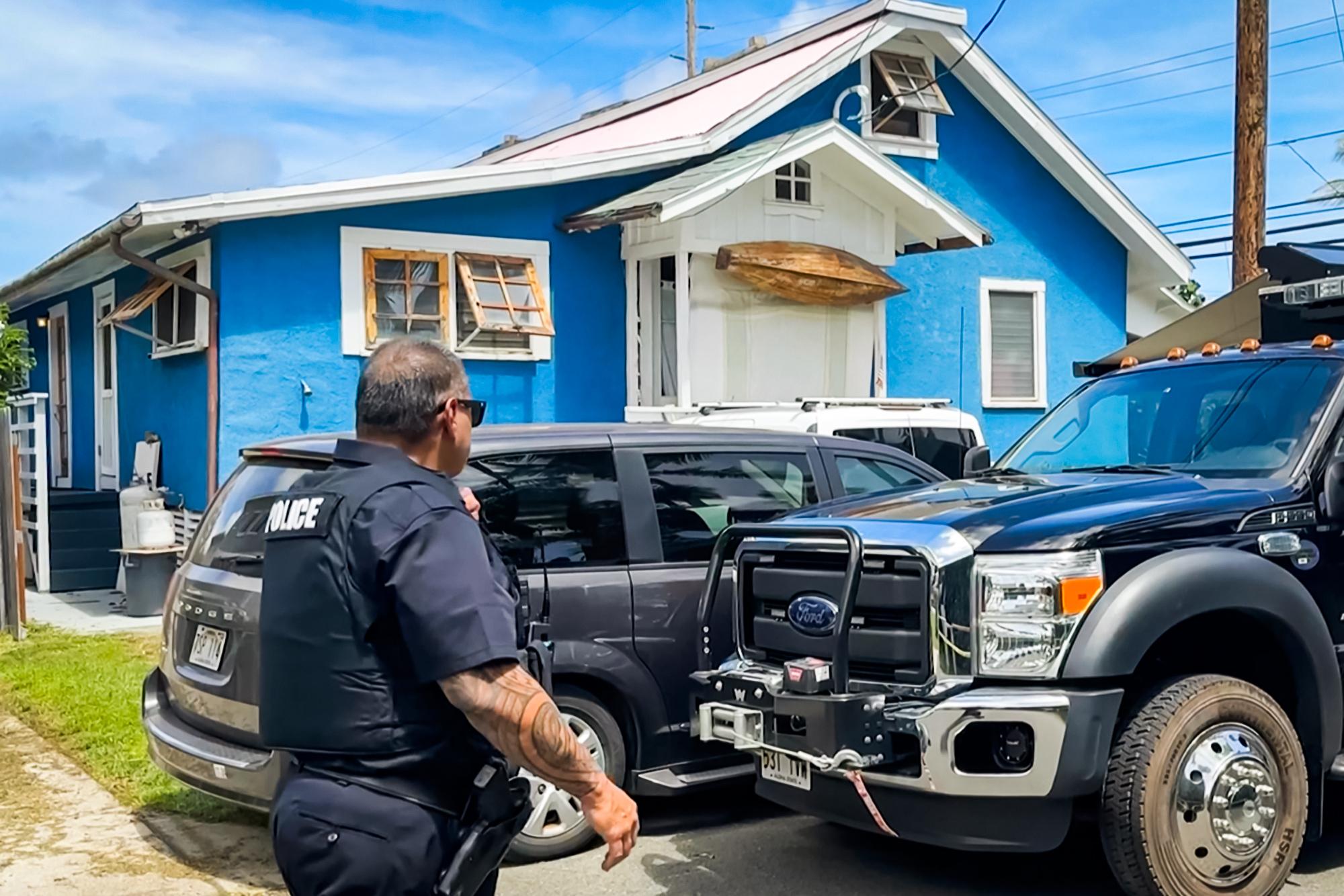KAAAWA, HAWAII, and GREENSBORO, N.C.—Mysteries enshroud Ryan Routh, the 58-year-old man charged with attempting to kill former President Donald Trump at his Florida golf course.
But one thing about Routh is clear to humanitarian aid worker Chelsea Walsh, a travel nurse who met him overseas.
Walsh, who warned U.S. authorities that Routh was dangerous more than two years ago, now says this about the foiled assassination attempt: “The Ryan I know, he definitely would have pulled the trigger without a second thought; I think they got him just in time.”
A few hundred yards away from the spot where Trump was golfing on Sept. 15, a Secret Service agent spotted a rifle barrel jutting through a brush-covered fence. The agent fired, causing the hidden gunman to flee. Police later arrested the suspect, identified as Routh.
In an interview with The Epoch Times, Walsh said federal officials should have done more to stop Routh sooner, based on alarms she and others raised about the eccentric man who gave her the creeps in Kyiv, Ukraine.
She met him through international networks that were assisting Ukraine after Russia invaded in early 2022.
Many of Routh’s actions—ranging from his militant advocacy in Ukraine to the alleged assassination attempt—defy easy explanation. So does Routh’s path to infamy. It began in his native North Carolina, then wound its way to Hawaii, Ukraine, and eventually Florida.
Interviews, public records, and news accounts reveal a once-promising life that crumbled under the weight of legal, financial, and apparent personal turmoil.
Strange but Harmless?
Walsh and others who knew Routh told The Epoch Times that his demeanor seemed odd; people wondered what was going on beneath his tousled shock of dishwater-blond hair.
On first blush, Walsh and others dismissed his quirkiness as benign.
But Walsh detected something sinister in Routh soon after meeting him in Ukraine on May 25, 2022—a date she knows because it’s memorialized in a text message from him.
“A progression of red flags” about Routh followed, she said.
Walsh couldn’t make sense of this fellow American who obsessed over the Ukrainian military yet had no prior military experience. He also had no discernible connection to Ukraine.

“It’s hard for people to understand this man,” she said, “unless you knew him personally.”
Routh was a busybody. He was always meddling in matters “that he had no business being involved with,” Walsh said.
Having traveled the globe for humanitarian purposes since she was 17, the 34-year-old nurse had encountered her share of unconventional people. But Routh, in particular, made her feel uncomfortable.
Walsh couldn’t fathom why he treated her “like his personal secretary” shortly after meeting her. Routh kept sending documents to her, unsolicited. “I don’t know why … it was strange,” she said.
She started noticing that he behaved impulsively, with violent tendencies. His conduct seemed to change on a whim, she said, depending on his mood; he tended to rant.
Routh repeatedly threatened to harm various world leaders, including Russian President Vladimir Putin; Trump, the Republican presidential nominee; and President Joe Biden, a Democrat.
Concerns Escalate
As a nurse, Walsh said she is trained to look for indicators of emotional, personality, or mental disorders. Walsh opined that she saw such signs in Routh, including a lack of empathy.
When a panhandler insistently sought money, Routh’s reaction stunned her. “He kicked the homeless guy in the town square,” she said.
Yet Routh had repeatedly proclaimed that a desire to help his fellow man inspired him to travel to Ukraine, 8,000 miles from his transplanted home in Hawaii.
His volunteer military-recruitment efforts in Ukraine drew attention from a number of media outlets, including large ones such as The New York Times and Newsweek.
Some news accounts seemed to uncritically accept Routh’s assertions, but Walsh took a more jaundiced view of Routh.
It troubled her to see him become extraordinarily angry over the slightest discord, she said. He threatened to blow up or burn down a Kyiv music studio where employees scoffed at his request to record a song he had written, Walsh said.
After that, Walsh concluded: “This guy is literally a loose cannon. He just wants to, like, hurt people.”
Other people shared disturbing anecdotes about Routh, too, Walsh said. She became an unwilling repository for information about Routh. “I feel like people came to me a lot because I had a moral compass,” Walsh said.
After learning so much about Routh, Walsh started to worry that he posed a threat to others, including her. She tried to distance herself from him. Then, partly because she was concerned about Routh, Walsh cut her visit to Ukraine short.

‘Ticking Time Bomb’
As soon as she returned to the United States, Walsh met with a Department of Homeland Security official at Dulles International Airport outside Washington, D.C.
On June 28, 2022, she spent an hour detailing her worries about Routh.
She recalls the official telling her that foreign issues were outside his agency’s purview; its work is limited to “threats to national security.”
To that, Walsh says she responded: “Well, then you guys need to keep an eye on Ryan Routh, because he’s a ticking time bomb. He’s coming back [to the U.S.], and he lives in Hawaii.”
The official “kind of nodded,” Walsh said. He took copies of Walsh’s ID and a notebook. “He said that he would pass the information on to, you know, whoever in the intelligence community,” Walsh recalled.
With that, Walsh assumed that investigators “would take it from there, and I would not have to be involved anymore,” she said.
She pushed Routh to the back of her mind and went on with her life. Walsh returned to Ukraine in late 2022 and, with the help of friends, stayed away from Routh.
During 2023, months after her last stint in Ukraine, she continued to receive messages about Routh from people there. In fact, that was how Walsh found out Routh had been arrested for the Trump assassination attempt.
“People started messaging me: ‘Chelsea, you were right,’” she said.
But she felt more frustrated than vindicated.
“Why did this even happen? Why did nobody listen to me?” Walsh said.
Homeland Security didn’t respond to The Epoch Times’ request for comment. Other government agencies received several additional reports about Routh dating to 2019, but it’s unclear what investigative steps they took.
In the aftermath of the assassination attempt, Walsh again contacted authorities.
Although Walsh said she could not publicly disclose which federal agency she phoned, she said the conversation lasted 22 minutes—and that a government employee yawned while she described her connection to Routh.
After that, more than 24 hours elapsed before an agency representative found Walsh at her Florida home, she said, adding that journalists reached her faster than the government did.
All of those circumstances led Walsh to believe that her concerns weren’t taken seriously enough.
“As an American citizen, I did my part and handed the information to the proper authorities, who I assumed would be doing their job, because it’s definitely not my job,” she said. “It was their job to contain the threat—and they did not.”



A Seemingly Strong Start
Decades before Walsh met Routh, he had made headlines for all the right reasons in his hometown of Greensboro, North Carolina.
During his boyhood, the local newspaper honored him as an Eagle Scout. When he was 25, he won a citizen-of-the-year award for helping police catch a rape suspect; the newspaper article’s all-caps headline read: “Crimefighting Pays.”
Other accounts in the Greensboro News and Record suggest that Routh cared deeply about his community.
As a newlywed with a newborn, he earned news coverage for lovingly sprucing up a 68-year-old home for his family; he eventually had three children, and later crusaded for a skateboard park that his son, Oran, founded.
The owner of United Roofing Co., Routh enlisted 40 of his employees to renovate a fellow churchgoer’s “tar-paper shack,” the newspaper reported.
At the time, Routh had a “clean-cut” appearance, too, says Eric Rasecke, a retired Greensboro police officer. In an Oct. 2 interview with The Epoch Times, Rasecke said: “He had everything going for him.”
Behind The Scenes, Problems Multiplied
For years, even as his public persona soared, Routh was getting into trouble with the law and with business associates.
He had begun accumulating a string of criminal convictions, mostly for writing bad checks and driving without a license. Those cases date to 1984, just before he turned 18. He also has faced a spate of lawsuits related to his business, plus state and federal tax liens, court records in Guilford County, North Carolina, show.
Rasecke estimated he had “well over 100 contacts” with Routh, dating to 1996. During Rasecke’s 26-year police career, Routh was the only person who had on-duty contact with him and also sought him out off-duty, the retired officer said.
A major turning point came in 2002.
Routh was charged with possessing “a weapon of mass destruction” that year, online court records in Guilford County, North Carolina, show.
Routh had “barricaded” himself inside his business, the News and Record reported, noting “the weapon of mass destruction” referred to “a fully automatic machine gun.” That three-hour standoff with police followed a traffic stop; it ended with Routh facing multiple charges, including resisting arrest.
He later pleaded guilty in connection with one of the weapons charges, court records show; he was put on probation.
As part of a plea agreement, a judge ordered Routh to undergo a mental evaluation and to follow any recommended treatment. The Epoch Times was unable to find results of any such tests, which normally do remain confidential.
That was around the time that Routh showed visible signs of deteriorating, the officer said.
Routh’s weight dropped; he appeared malnourished. His cheeks were sunken. His teeth were “eroding away,” and he became more paranoid, Rasecke said, adding that the smell of marijuana “was present always around his house.”
Increasingly, Routh became paranoid, Rasecke said. He thought the city of Greensboro and its police officers had a vendetta against him. He blamed them for causing his problems, but “we would go out of our way to try to help him,” Rasecke said.
In Rasecke’s opinion, Routh was exhibiting telltale signs of a drug abuse problem. But Rasecke said he doesn’t think Routh was ever convicted of a drug offense. In court records, Routh denied using alcohol or drugs.
Meanwhile, Routh maintained “a grandiose opinion of himself,” Rasecke said.
‘Big Ideas’ Fell Flat
Until the standoff, “he was thought of pretty highly” in Greensboro, said Scott Becraft, who has known Routh since 1993.
The 2002 incident “really kind of threw everybody over the edge, when he holed himself up in his office,” Becraft said.
Becraft had owned Roofing Supply Group of Greensboro, one of several companies that filed court actions against Routh. Now under different ownership, the company had sold shingles to Routh’s roofing company, Becraft said.
He was familiar with Routh’s history of passing bad checks, adding, “Ryan was never good with money.”
Becraft emphasized that he never knew Routh to be violent, so that’s why the assassination-attempt allegations surprised him.
Still, Becraft sensed something amiss with Routh. “You could always tell he was very preoccupied,” Becraft said.
Routh had a habit of “grabbing a cause” and running with it; he enjoyed being in the limelight and “talked a big game,” Becraft said.
“He never really saw a lot of results from big ideas that he had,” Becraft said.
Perplexing Circumstances
So far, no evidence has been released indicating whether anyone helped Routh put together his alleged plan to slay Trump.
Police killed another suspected gunman, Thomas Matthew Crooks, at the site of a July 13 attempt on the former president’s life at a campaign rally in Butler Township, Pennsylvania.
As a result, Routh is the first suspect accused of attempting to kill an American president or presidential candidate since 1981. A jury found John Hinckley Jr. not guilty by reason of insanity for wounding President Ronald Reagan; Hinckley spent decades at a mental hospital before he was released from supervision in 2022.
Routh is scheduled to stand trial next month, but that date likely won’t stand. Prosecutors say they need more time for investigators to gather evidence, which already includes hundreds of interviews and evidence seized from more than a dozen searches in Florida, Hawaii, and North Carolina.
People who knew Routh said he didn’t seem to have much money. Yet he somehow was able to afford costly trips from Hawaii to Ukraine, back to Hawaii, then to North Carolina, and later to the Florida golf course.
Authorities haven’t stated where Routh was before he traveled to West Palm Beach to allegedly carry out his plan, but they did acknowledge he had been at the golf course for at least 12 hours prior to Trump’s arrival.
That begs other questions: Why didn’t Trump’s protectors notice him sooner? Did someone tip off Routh about Trump’s previously unscheduled golf outing? If so, what inside connections did Routh possibly have?

Answers to those questions and others could become public either during Routh’s trial or after a congressional committee releases its findings of probes into the Pennsylvania and Florida assassination attempts.
Rep. Mike Kelly (R-Pa.), who chairs the committee, did not immediately respond to a request for comment. The office of Kristy Militello, Routh’s public defender in the assassination-attempt case, declined to comment on his behalf, as did Routh’s ex-wife, Lora Routh.
Old Life Left Behind
Although Routh is believed to have moved to Hawaii about six years ago, vestiges of his old life linger in his hometown of Greensboro.
A drooping sign forlornly advertises his former roofing company, overgrown with weeds.
The Epoch Times talked to more than a half-dozen North Carolinians who live or work near his last known address, a one-story gray house on Hiatt Street, but none said they knew Routh well.
Most were aware of the assassination-attempt allegations; some seemed surprised to hear that North Carolina voter records still show Routh remained an active voter at the Hiatt address.
There is no record of Routh casting a North Carolina ballot in the presidential election in 2016 or 2020. Yet, in a book he wrote about Ukraine, Routh implied that he voted for Trump in 2016 and regretted doing so. He also told Iran, “You are free to assassinate Trump.”
This past winter, Routh returned to North Carolina and cast a Democratic Party ballot. He did so in person during the March 5 presidential primary election. That marked Routh’s first North Carolina vote in a dozen years.
Around that same time, Routh was in his old neighborhood, going door-to-door and handing out flyers offering his former home for sale, according to neighbors.
The man who purchased the property, Edward Doerner of Greensboro, told The Epoch Times that the house was in such poor condition, “I don’t see how anyone could have lived there.”
He paid $170,000 for the house, bought from Routh’s daughter, Sara Routh, on March 13—a week after the primary election.
Asked whether Routh could legally vote in North Carolina at that time while reportedly living in Hawaii, Charlie Collicutt, elections director in North Carolina’s Guilford County, told The Epoch Times there’s “a big unknown” as to whether Routh established Hawaii residency.
Routh had obtained a change-of-address form in 2016 but he never returned it, Collicutt said. Five years later, after no activity, Routh’s voter registration status changed to “inactive.” But when he voted this year, Routh again became an “active” voter; he listed his past Hiatt Street address.



By state law, “if he is considering this to be his residence, then that’s where he would be eligible to vote,” the director said.
Yet Routh indeed was registered to vote in Hawaii, said Rex Quidilla, election administrator in Honolulu city and county. Routh was registered to vote in precinct 48-01, Quidilla told The Epoch Times. Quidilla said state law prevented him from revealing further details, including when Routh registered or whether he had ever voted in Hawaii.
Aloha, Hawaii
Routh appears to have moved to his new home in the Hawaiian countryside, 4,700 miles away from his problematic life in North Carolina, around 2017–18, online searches show.
Kathleen Shaffer is listed as the owner of the house where he lived in Kaaawa, Hawaii, on the island of Oahu. It’s a community of 1,400 people, about 25 miles north of Honolulu.
Attempts to reach Shaffer for comment proved unsuccessful. Routh’s sons, Oran and Adam, have risen to his defense, saying that the alleged criminal conduct was out of character for him.
But, amid scrutiny stemming from their father’s arrest, FBI agents say they found child pornography on Oran Routh’s computer, leading to the 35-year-old’s arrest in Greensboro on Sept. 21.
When The Epoch Times approached people in and around Ryan Routh’s Kaaawa neighborhood, many said they had no idea who Routh was; only a few even knew that he had earned a spot in the history books with his arrest.
That lack of national news awareness is a feature of life for many in Hawaii, said Bob McDermott, a Republican candidate seeking to represent Hawaii in the U.S. Senate.
He explained that the nation’s largest TV networks are based in the Eastern time zone, which is 18 hours behind Hawaii Standard Time. As a result, when news programs and political shows air from 6 p.m. to 10 p.m. Eastern, that’s 12 p.m. to 4 p.m. in Hawaii—times when most people are at work.
So people in Hawaii generally have little exposure to national news, and “there is virtually no political coverage here,” McDermott said.
Political posters in the area tout mostly local candidates, but McDermott’s signs were posted in a couple of prominent places in Kaaawa; no signs for U.S. presidential candidates were obvious on that part of Oahu, although a reporter spotted one large Trump sign on a Honolulu street corner.
Hawaii’s veritable news famine has worsened in recent years with the “leftward shift” of news media reports, said McDermott, a Pennsylvania transplant who has lived in Hawaii for four decades.
Another factor that makes people ignore news: many are drawn to Hawaii by the allure of a tranquil life. They envision relaxing on quiet beaches lined with swaying palm trees, with the sound of ukuleles in the air.

But life in Hawaii can be more stressful than some people expect. Earlier this year, WalletHub named Hawaii the nation’s worst state for drivers; it’s plagued by bad roads and heavy traffic, and high costs of owning and maintaining a vehicle.
In addition, people who live in Hawaii are saddled with an extraordinarily high cost of living—66 percent higher than the U.S. average, according to bestplaces.com.
Against this backdrop, McDermott said, Routh’s alleged plot to kill Trump barely registered a blip in and around Honolulu.
“I’ve never heard of the guy, and no one’s talking about it,” he said a few days after Routh’s arrest. “It’s an absolute surprise to me that he ever lived here.”
Routh Seemed ‘Mellow’ to Him
A man named J.J., who lives in the same general area as Routh, spoke to an Epoch Times reporter while he and a buddy sat on a flatbed trailer, drinking bottles of Modelo beer after work.
He was surprised when he saw a news report about the Trump golf course incident and recognized the suspect.
J.J., who declined to give his last name, said he met Routh about three years ago. He didn’t envision someone like Routh would “go to that extent.” As far as J.J. knew, Routh “wasn’t a bad guy.”
The two met because of their mutual interest in construction work, J.J. said.
Routh seemed to be a “nice guy” and he “wasn’t a troublemaker,” J.J. said. He considered Routh to be “mellow,” and soft-spoken. His appearance, though, seemed “kind of grungy,” J.J. said.
J.J. said he didn’t consider Routh to be the “weirdo” that some people are perceiving him to be.
Routh never explained to J.J. why he moved from North Carolina to Hawaii, J.J. said, nor did he discuss politics or his involvement in Ukraine.
“None of that stuff” surfaced during their conversations, J.J. said. “I didn’t know his personal inner thoughts, whatever was going on in his head; we only talked about construction.
“I thought he was just a regular guy trying to make ends meet in Hawaii,” J.J. said.

Asked if he ever hung out with Routh, J.J. said no, and he didn’t know where Routh socialized. But he doubted it was in the neighborhood where he lived. People in that area are mostly lifelong residents who maintain a tight inner circle.
“The original people that were there, they hang together. They don’t really meet the new outsiders that just came in recently,” J.J. said, adding, “they’re all nice people” but they avoid “transplants.”
Those locals tend to hang out at each other’s houses. So, “nobody really knew that guy, I would say,” J.J. said.
Isolated By Choice
Nestled at the foot of a mountainside, a stone’s throw from Oahu’s windward-side beach, Routh’s neighborhood includes several houses in disrepair, including his.
At some addresses, Rottweilers and pit bulls stand guard behind chain-link fences bearing “Beware of Dog” warnings—underscoring the notion: privacy is paramount.
The place Routh called home, a bright blue, two-story structure, sits at the corner of the two-lane Kamehameha Highway, an access road.
Four days after the assassination attempt in Florida, two fresh-looking “No Trespassing” signs were posted at Routh’s house, with warnings that violators will be prosecuted. No one appeared to be home.
A small American flag was perched atop wooden fish cutouts painted in vivid colors.
Routh’s white Ford F-250 pickup truck, its bed loaded with scrap wood and other materials, sat disabled with a flat rear tire.

On its tailgate, a bumper sticker advertises Camp Box Honolulu, Routh’s “tiny homes” business.
Routh’s website (now suspended) says he was offering alternatives to high-priced real estate in Hawaii, which he blamed for the state’s homelessness problem.
The 1,640-square-foot stucco house where Routh lived was built in 1935, has no air conditioning, and is not in tip-top condition. Yet its market value is nearly $900,000, according to several online sources including Zillow.com.
Curtis Lum, a spokesman for Honolulu’s Department of Planning and Permitting, told The Epoch Times that his office had received no complaints about Routh or his work. Routh’s name was unfamiliar to that agency until reporters started making inquiries in the wake of his arrest, he said.
Routh’s website represents that his customers could sidestep the complex permitting process if they bought tiny homes. But Lum countered: “Any structure that’s going to be inhabited would require a building permit, regardless of size.” One Camp Box model measured only 8 feet by 15 feet.
A second bumper sticker on Routh’s truck promotes the former Democratic presidential ticket, Biden and Vice President Kamala Harris.
The Biden–Harris sticker preceded Biden’s exit from the race, leaving Harris and Trump to face off in the Nov. 5 election.
Even so, Routh “never was involved in any political stuff here that I could tell,” McDermott said, adding, “It’s a real odd situation.”










